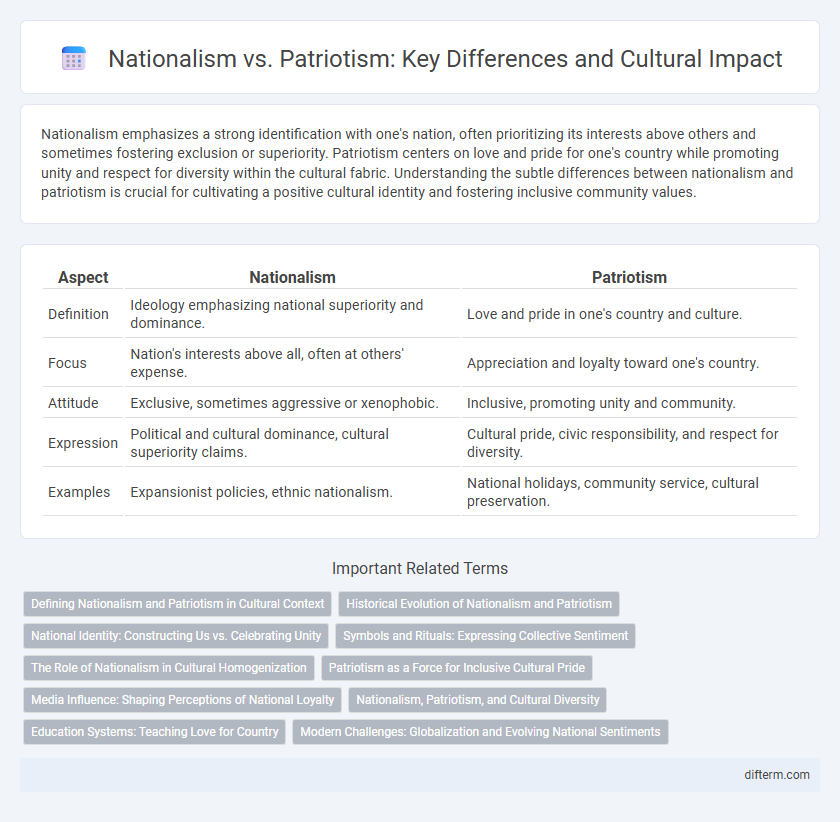Nationalism emphasizes a strong identification with one's nation, often prioritizing its interests above others and sometimes fostering exclusion or superiority. Patriotism centers on love and pride for one's country while promoting unity and respect for diversity within the cultural fabric. Understanding the subtle differences between nationalism and patriotism is crucial for cultivating a positive cultural identity and fostering inclusive community values.
Table of Comparison
| Aspect | Nationalism | Patriotism |
|---|---|---|
| Definition | Ideology emphasizing national superiority and dominance. | Love and pride in one's country and culture. |
| Focus | Nation's interests above all, often at others' expense. | Appreciation and loyalty toward one's country. |
| Attitude | Exclusive, sometimes aggressive or xenophobic. | Inclusive, promoting unity and community. |
| Expression | Political and cultural dominance, cultural superiority claims. | Cultural pride, civic responsibility, and respect for diversity. |
| Examples | Expansionist policies, ethnic nationalism. | National holidays, community service, cultural preservation. |
Defining Nationalism and Patriotism in Cultural Context
Nationalism emphasizes a strong identification with one's nation, often prioritizing national sovereignty and cultural unity, sometimes at the expense of other groups. Patriotism represents a sense of pride and love for one's country, fostering cultural heritage and shared values without necessarily excluding others. In cultural contexts, nationalism can lead to exclusive cultural preservation, while patriotism encourages inclusive celebration of diverse cultural traditions within the nation.
Historical Evolution of Nationalism and Patriotism
Nationalism and patriotism have evolved distinctly throughout history, with nationalism emerging in the 18th century during the rise of nation-states, emphasizing a collective identity often tied to ethnicity or culture. Patriotism, by contrast, has roots in earlier civic loyalty to a state or political entity, prioritizing allegiance to shared values and institutions rather than ethnic or cultural homogeneity. The 19th and 20th centuries saw nationalism fuel both unification movements, such as in Germany and Italy, and destructive conflicts, while patriotism became associated with democratic participation and national unity within pluralistic societies.
National Identity: Constructing Us vs. Celebrating Unity
National identity shapes the collective consciousness by constructing an "us" that differentiates insiders from outsiders, often fueling nationalism through exclusivity and dominance narratives. Patriotism, in contrast, emphasizes celebrating unity and shared values, fostering cohesion without negating diversity or other identities. This distinction influences cultural expressions, social policies, and the dynamics between inclusion and exclusion within societies.
Symbols and Rituals: Expressing Collective Sentiment
Symbols such as flags, anthems, and monuments serve as powerful tools for both nationalism and patriotism, embodying collective identity and historical narratives. Rituals including national holidays, commemorative ceremonies, and public displays of allegiance reinforce shared values and emotional bonds within a community. These symbolic practices cultivate a sense of belonging and collective sentiment, distinguishing national pride from exclusionary nationalism.
The Role of Nationalism in Cultural Homogenization
Nationalism often drives cultural homogenization by promoting a dominant national identity that suppresses regional and minority cultures, leading to reduced cultural diversity. Policies rooted in nationalism tend to standardize language, traditions, and customs to strengthen national unity, which can marginalize unique cultural expressions. This process impacts social cohesion by prioritizing conformity over multiculturalism, altering the cultural landscape within nation-states.
Patriotism as a Force for Inclusive Cultural Pride
Patriotism fosters inclusive cultural pride by emphasizing shared values and collective identity that transcend ethnic and social divisions. It promotes unity through recognition and celebration of diverse traditions within a nation, strengthening social cohesion and mutual respect. As an inclusive force, patriotism encourages active participation in cultural preservation while embracing pluralism and equality.
Media Influence: Shaping Perceptions of National Loyalty
Media outlets play a critical role in shaping public perceptions of nationalism and patriotism by framing national loyalty through selective narratives and emotional appeals. News coverage, social media, and entertainment often blur the lines between inclusive patriotism and exclusionary nationalism, influencing societal attitudes and political behaviors. This influence impacts identity formation, policy support, and intergroup relations within culturally diverse societies.
Nationalism, Patriotism, and Cultural Diversity
Nationalism emphasizes strong loyalty to one's nation, often promoting a homogeneous cultural identity that can challenge cultural diversity by prioritizing national unity over multiculturalism. Patriotism fosters pride in one's country while encouraging respect and appreciation for diverse cultural backgrounds within the nation. Balancing nationalism and patriotism is crucial for maintaining a vibrant, inclusive cultural landscape that honors both national pride and cultural diversity.
Education Systems: Teaching Love for Country
Education systems shape perspectives on nationalism and patriotism by emphasizing civic values and historical understanding. Curricula that promote critical thinking encourage students to appreciate cultural diversity while fostering a genuine love for their country. Integrating lessons on human rights and democratic principles cultivates informed patriotism rather than exclusionary nationalism.
Modern Challenges: Globalization and Evolving National Sentiments
Globalization challenges traditional nationalism by promoting interconnected economies and cross-cultural exchanges that dilute rigid national identities. Patriotism adapts more fluidly to modern realities, emphasizing pride in shared values and democratic ideals rather than ethnic or territorial exclusivity. Evolving national sentiments reflect this shift, as citizens increasingly balance local loyalty with global awareness and cooperation.
nationalism vs patriotism Infographic

 difterm.com
difterm.com